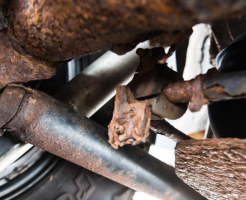
— A Toyota FJ Cruiser frame rust lawsuit alleges the frames prematurely corrode and rust to the point the FJ Cruisers are allegedly dangerous to drive.
The class action lawsuit alleges frame rust destroys 2007-2014 Toyota FJ Cruisers and causes owners to pay to repair Toyota's mistakes.
According to the lawsuit, testing of the FJ Cruiser frames reveal corrosion occurs due to a lack of zinc phosphate coating used to protect the frames.
According to the FJ Cruiser rust class action:
"Indeed, analysis documented the discontinuous nature of the zinc phosphorus layer (pretreatment) in all of the frames analyzed. A discontinuous coating allows sections of the frame to be unprotected and, therefore, more likely to suffer rust damage."
The plaintiffs allege Toyota didn't warn FJ Cruiser owners about rusted frames even though other Toyota models had suffered from the same rust problems and Toyota had allegedly done something about it.
Those plaintiffs also reference complaints about Toyota FJ Cruiser frame rust and how the automaker touted the frames as having an “Electrocoat Deposition (ED) protective coating” that “seals every nook and cranny and helps the frame live long and strong.”
Toyota FJ Cruiser Frame Rust Lawsuit Dismissed
In a motion to dismiss the frame rust lawsuit, Toyota alleges all the claims should be dismissed for a variety of reasons.
The automaker began by concluding the FJ Cruiser frame rust lawsuit does not adequately differentiate between what Toyota USA allegedly did and what Toyota Japan did.
According to the judge, "neither defendant has sufficient notice of its alleged role in the fraudulent scheme Plaintiffs attempt to allege."
Toyota told Judge Percy Anderson the class action lawsuit makes allegations concerning how Toyota allegedly knew about FJ Cruiser frame rust and corrosion problems because the same problems occurred in “similar” 2005-2010 Toyota trucks.
But the judge found the class action doesn't "allege sufficient facts to explain how the Toyota trucks are similar to the FJ Cruiser."
The judge also found many of the reported problems with the allegedly "similar" trucks and the various announced service campaigns for those trucks didn't begin until 2014 or later.
According to the judge, this means actions taken by Toyota regarding vehicles other than 2007-2014 FJ Cruisers, "do not logically or plausibly support an inference that Toyota knew about, misrepresented, or concealed a defect in the 2007-2014 FJ Cruisers when Defendants marketed and sold those vehicles."
The judge also ruled about allegations concerning a small number of excessive rust reports beginning in 2012 that do not plausibly suggest Toyota knew about and concealed alleged frame defects.
In its motion, Toyota also argues the plaintiffs cannot assert claims under California law on behalf of a nationwide class of FJ Cruiser customers. The judge agreed and dismissed the nationwide class claims based on California’s consumer protection laws, and without leave to amend the lawsuit.
The judge then moved on to arguments regarding statutes of limitations. Toyota argues several plaintiffs who filed the FJ Cruiser frame rust lawsuit first discovered the problems as early as 2012. Therefore, Toyota contends those claims are barred by the applicable statutes of limitations.
And regarding alleged violations of implied warranties, the automaker asserts those claims are untimely because they are barred by the four-year statutes of limitations.
The plaintiffs, on the other hand, claim the limitations should be ignored because Toyota allegedly concealed the rust problems and said the rusted frames were normal.
The judge responded by saying, "issues related to the statutes of limitations are not amenable to resolution at this stage of the proceedings." The judge also ruled the class action lawsuit, "does not adequately allege Defendants’ knowledge of the alleged defect to support a fraudulent concealment theory."
By the end, the judge dismissed claims for unjust enrichment and declaratory relief without leave to amend. Judge Anderson also dismissed nationwide class claims based on California law, and without leave to amend.
However, the remaining dismissed claims were dismissed with leave to amend, leaving the plaintiffs the right to refile certain claims over alleged Toyota FJ Cruiser frame rust problems.
The Toyota class action lawsuit was filed by these FJ Cruiser customers.
- Elliot Nazos / Florida / 2010 Toyota FJ Cruiser
- Christine Blight / Pennsylvania / 2007 Toyota FJ Cruiser
- Jack Perry / Ohio / 2010 Toyota FJ Cruiser
- Patricia Loughney / Colorado / 2010 Toyota FJ Cruiser
- Emily Barbour / New Jersey / 2007 Toyota FJ Cruiser
- Thomas Pastore / New York / 2007 Toyota FJ Cruiser
- Brian Hale / Virginia / 2007 Toyota FJ Cruiser
- Timothy Dotson / Maryland / 2007 Toyota FJ Cruiser
- Jill Silvernale / Michigan / 2007 Toyota FJ Cruiser
- Kyle Blumin / Utah / 2013 Toyota FJ Cruiser
The Toyota FJ Cruiser frame rust class action lawsuit was filed in the U.S. District Court for the Central District of California: Elliot Nazos, et al., v. Toyota Motor Corporation, et al.
The plaintiffs are represented by Edelsberg Law, P.A., Kopelowitz Ostrow Ferguson Weiselberg Gilbert, Bleichmar Fonti & Auld LLP, Gordon & Partners, P.A., and the Law Office of Dennis O. Cohen, PLLC.




